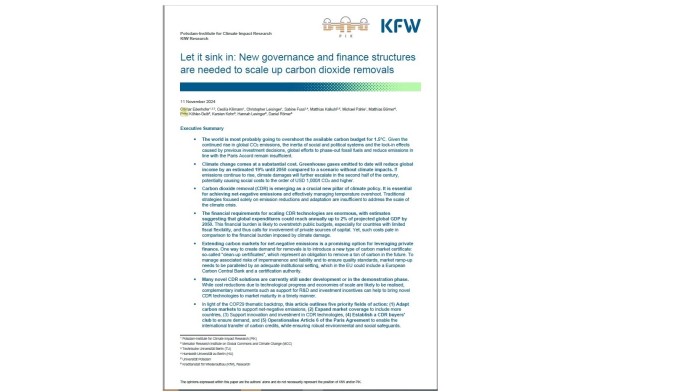Against the backdrop of increasing climate events related to global warming, the UN climate summit COP29 (29th UN Conference of the Parties) will once again highlight the progress made on climate commitments to date and renew the call for increased global action.
The negotiations will focus on the adoption of a new target for climate finance. As a result, the new collective quantified goal (NCQG) will replace the previous target of USD 100 billion per year. An agreement on more ambitious provision of financial resources as well as a reassessment of the form of financial flows could facilitate fulfilling and increasing climate protection commitments in the global South in line with a just and equitable low-carbon pathway. Another important point is the financing of loss and damage caused by climate change and closing the financing gap for adaptation measures, which currently lies between USD 194 and 366 billion per year. The conference should also aim to make progress on the regulatory framework for trading in global carbon markets in line with Article 6.

The world faces a realistic risk of exceeding the available carbon budget in line with global warming of up to 1.5 degrees Celsius. Given the continued rise in global CO2 emissions and insufficient efforts to reduce fossil fuels, there is a threat of significant economic losses that could lead to an estimated 19% drop in global income by 2050. Carbon dioxide removal (CDR) as a new pillar of climate policy alongside traditional strategies – adaptation and mitigation – is crucial to address the temporary temperature overshoot. However, the financial requirements for scaling up CDR technologies are enormous and need to be addressed in a timely manner. Private sources of capital are essential for financing, while innovative approaches such as the introduction of “clean-up certificates” can not only mobilise private financing but also ensure the quality and consistency of the measures.
Against the backdrop of the upcoming COP29, this article by KfW Research and the Potsdam Institute for Climate Impact Research outlines five key areas of action to drive market adaptation, innovation and international cooperation in the field of CO2 removal and thus make a decisive contribution to tackling the climate crisis.
Let it sink in: New governance and finance structures are needed to scale up carbon dioxide removals
November 2024
KfW Research, KfW Group, Palmengartenstrasse 5-9, 60325 Frankfurt, Germany, research@kfw.de
Share page
To share the content of this page with your network, click on one of the icons below.
Note on data protection: When you share content, your personal data is transferred to the selected network.
Data protection
Alternatively, you can also copy the short link: https://www.kfw.de/s/enkB2yJN
Copy link Link copied